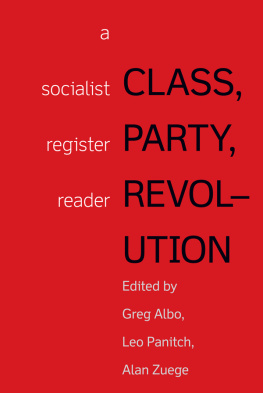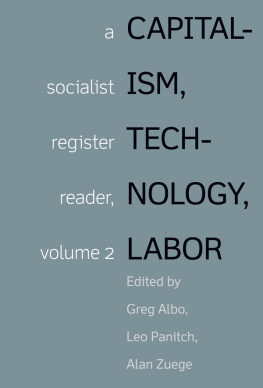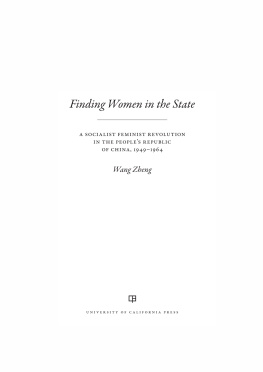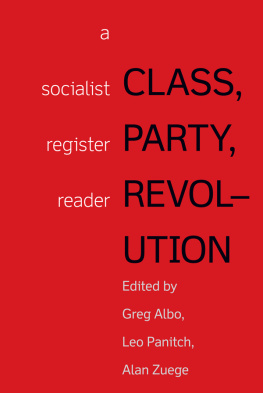Leo Panitch - Class, Party, Revolution: A Socialist Register Reader (Socialist Register Classics Book 1)
Here you can read online Leo Panitch - Class, Party, Revolution: A Socialist Register Reader (Socialist Register Classics Book 1) full text of the book (entire story) in english for free. Download pdf and epub, get meaning, cover and reviews about this ebook. publisher: Perseus Books, LLC, genre: Politics. Description of the work, (preface) as well as reviews are available. Best literature library LitArk.com created for fans of good reading and offers a wide selection of genres:
Romance novel
Science fiction
Adventure
Detective
Science
History
Home and family
Prose
Art
Politics
Computer
Non-fiction
Religion
Business
Children
Humor
Choose a favorite category and find really read worthwhile books. Enjoy immersion in the world of imagination, feel the emotions of the characters or learn something new for yourself, make an fascinating discovery.
- Book:Class, Party, Revolution: A Socialist Register Reader (Socialist Register Classics Book 1)
- Author:
- Publisher:Perseus Books, LLC
- Genre:
- Rating:4 / 5
- Favourites:Add to favourites
- Your mark:
- 80
- 1
- 2
- 3
- 4
- 5
Class, Party, Revolution: A Socialist Register Reader (Socialist Register Classics Book 1): summary, description and annotation
We offer to read an annotation, description, summary or preface (depends on what the author of the book "Class, Party, Revolution: A Socialist Register Reader (Socialist Register Classics Book 1)" wrote himself). If you haven't found the necessary information about the book — write in the comments, we will try to find it.
Leo Panitch: author's other books
Who wrote Class, Party, Revolution: A Socialist Register Reader (Socialist Register Classics Book 1)? Find out the surname, the name of the author of the book and a list of all author's works by series.
Class, Party, Revolution: A Socialist Register Reader (Socialist Register Classics Book 1) — read online for free the complete book (whole text) full work
Below is the text of the book, divided by pages. System saving the place of the last page read, allows you to conveniently read the book "Class, Party, Revolution: A Socialist Register Reader (Socialist Register Classics Book 1)" online for free, without having to search again every time where you left off. Put a bookmark, and you can go to the page where you finished reading at any time.
Font size:
Interval:
Bookmark:
CLASS, PARTY, REVOLUTION
2018 Socialist Register
Published in 2018 by
Haymarket Books
P.O. Box 180165
Chicago, IL 60618
773-583-7884 www.haymarketbooks.org
ISBN: 978-1-60846-920-8
Trade distribution:
In the US, Consortium Book Sales and Distribution, www.cbsd.com
In Canada, Publishers Group Canada, www.pgcbooks.ca
In the UK, Turnaround Publisher Services, www.turnaround-uk.com
All other countries, Ingram Publisher Services International,
This book was published with the generous support of Lannan Foundation and Wallace Action Fund.
Cover design by Eric Kerl.
Library of Congress Cataloging-in-Publication data is available.

CLASS,
PARTY,
REVOLUTION
A SOCIALIST REGISTER READER
EDITED BY
GREG ALBO, LEO PANITCH, AND ALAN ZUEGE
SOCIALIST REGISTER CLASSICS
VOLUME 1

CLASS, PARTY, REVOLUTION:
AN INTRODUCTION
When Haymarket Books first raised the idea a number of years ago of publishing the classic essays that have appeared in the Socialist Register over the past five decades, we were obviously both flattered and enthusiastic. Other pressing commitments initially delayed bringing this to fruition, not least the work involved in planning, commissioning, editing, and publishing each new annual volume of the Register. But as interest in socialist ideas and politics surged in the current political conjuncture and as leading figures in this renewalfrom Jacobin in the US to Momentum in the UK and Syriza in Greecetold us how they were influenced by the Register, we realized we could delay no longer in making available to a new generation some of its key contributions over the years.
The Socialist Registers emergence in 1964 was itself a significant moment in the emergence of the New Left at the time. As the Registers founding editors, Ralph Miliband and John Saville, put it in their preface introducing the first Register as an annual volume of socialist analysis and discussion, they believed that the possibility for this proving fruitful was now greater than for a long time past. This indeed proved to be the case. Even before the mass radical political explosions of 1968, prominent essays in the Register sought to think through a way forward for socialists beyond the ideological bankruptcy and institutional sclerosis of both the social democratic and Communist parties. This was especially the case with the essay we have chosen to open this collection, one of the most famous and intellectually influential the Register ever published, Andr Gorzs Reform and Revolution, first published in the 1968 volume. It reads today as an epitaph to what happened with the Syriza government in Greeceand as a clarion call for what strategic preparations should already be in train to avoid a Corbyn-led Labour government in the UK experiencing the same fate.
Beginning from the insight, far ahead of its time, that it was already then the case that the Keynesian welfare states expanding social and collective services were no longer compatible with the pursuit of dynamic capitalist accumulation, Gorz posedperhaps more clearly than anyone sincethe stark choices facing any government with even reformist ambitions. New kinds of structural reforms were required, as Gorz understood so clearly, involving,
a more rapid development of social services and public intervention than in the past, demanding a much more extensive socialization of the economy, including nationalizations, collectivization of saving and the investment function, global (i.e., planned) public direction of the economy, and priority of collective consumption and services.
Since all of this is destined to make a political impact on the modes of development, consumption, and civilization, and on the style of life, the strategic preparation for this, which actually entails uncovering its possibility, needs to be seen as educational, ideological and cultural as much as, or more than, technical in the policy and administrative sense. Ensuring that a socialist strategy for structural reform would never be institutionalized (in ways that would blunt the advancement of popular and working class powers) requires the creation of centres of social control and direct democracy alongside the conquest of positions of strength in representative assemblies. Even though such a strategy carries with it the inevitable consequence of an intensification and deepening of the antagonism between the logic of social production and the logic of capitalist accumulation and the power of management, it involves a new sort of gradualism, oriented to creating the objective and subjective conditions to prepare the social and political positions of strength.
Written on the eve of May 1968, Gorzs essay may have struck many of its first readers as counseling undue strategic patience as opposed to looking for new insurrectionary possibilities. But by the time the 1969 Register appeared, Lucio Magris renowned reflection on The May Events and Revolution in the West helped to clarify that while reformist optimism, whether liberal or socialist, has come to an end, so did the May events teach us that the question of revolution in its highest form cannot just be taken up again at the point where it was interrupted in 1923. Insofar as the spontaneous movement was unable to do more than express an extraordinarily radical spirit of revolt, what this proved was that there had to be already an alternative social force active within the social body, with the capacity to illuminate the socialist perspectives within the present society. To be sure, Magri identified the leading role played by two types of workers who had never previously been outstanding in trade union struggleson the one hand, young unskilled workers condemned to the most repetitive and underpaid jobs and, on the other, young technicians skilled enough to perform delicate tasks but faced with the downgrading of the university degree and no managerial possibilitieswhich showed that a socialist strategy still needed to be seeded in this transformed working class.
What May 1968 also revealed was the profound gap [that] existed between the social movement that burst out in such a novel way and the strategy of the traditional revolutionary forces (the Communist Party and the left-wing groupuscules). Yet it was also the libertarian polemic against the party as such that disarmed the May movementcrucifying it on its own spontaneity. While recognizing that the very concept of the revolutionary party seen in terms of an organized vanguard with a well-defined ideology and a centralized leadership deserved to be fundamentally challenged, this called for a no less fundamental reappraisal of the relationship between the party and the movement. Since revolutionary praxis is many-sided, the party needed to be seen as a point of synthesis, of fermentation, where the universal is extracted from the particular. This means that it is not the movement that serves the party, but the party that serves the movement it is not the party that will hold state power, but the masses that use the party to prevent political power from ossifying.
For Magri, all this involved finally saying goodbye to the Jacobinism which characterized so much of twentieth-century revolutionary politics, and going back to the Marxian concept of the socialist revolution. This is in fact what the
Next pageFont size:
Interval:
Bookmark:
Similar books «Class, Party, Revolution: A Socialist Register Reader (Socialist Register Classics Book 1)»
Look at similar books to Class, Party, Revolution: A Socialist Register Reader (Socialist Register Classics Book 1). We have selected literature similar in name and meaning in the hope of providing readers with more options to find new, interesting, not yet read works.
Discussion, reviews of the book Class, Party, Revolution: A Socialist Register Reader (Socialist Register Classics Book 1) and just readers' own opinions. Leave your comments, write what you think about the work, its meaning or the main characters. Specify what exactly you liked and what you didn't like, and why you think so.













